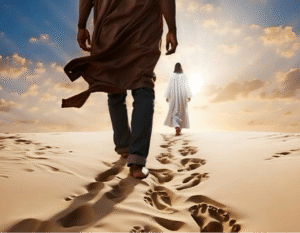For much of biblical history, the people of God lived with a certain rhythm; God would arrive in power, reveal His will, renew His people and then His manifested presence would recede. This pattern shaped entire generations. They experienced God through divine visitations that marked moments of turning, repentance, national direction or covenant renewal.
Yet scripture shows that the heart of God was never limited to brief moments of visitation. From Eden to the early church, the consistent theme is that God desires habitation. His ultimate intention has never been occasional encounters. It has always been to dwell among His people in ongoing relationship.
- “I will walk among you and be your God, and you shall be My people.” (Leviticus 26:12)
- “My dwelling place shall be with them; and I will be their God.” (Ezekiel 37:27)
This movement from visitation to habitation is not only a biblical theme. It is becoming a defining issue in the global church today. Many communities sense that God is calling His people out of moments of temporary inspiration and into lives where His presence is a sustained environment rather than an event.
The Old Testament Pattern of Visitation
In the ancient world, God often revealed Himself in ways that were powerful and visible. Abraham experienced visitations that shifted his entire destiny (Genesis 18:1–2). Jacob wrestled with God in the night (Genesis 32:24–30). Moses met God upon the mountain (Exodus 33:18–23), and the nation trembled as the voice of God thundered across the land (Exodus 20:18–19).
Over time, the tabernacle and later the temple became places where God visited His people. His glory would fill the sanctuary, overwhelming the priests and signaling His nearness. The priests could not stand to minister, and the people knew that God was near. Yet the people still lived at a distance. These moments were profound but occasional. The sacrificial system and priestly mediation reminded them that full intimacy was still ahead. God was with them, but not dwelling within them in the way He intended.
The Prophetic Promise of Habitation
Even before Jesus arrived the prophets began to speak of something greater. Isaiah, Jeremiah and Ezekiel pointed toward a future where God would write His law upon hearts and place His Spirit within His people. The point was clear. God would not only visit His people in holy places. He would dwell among them and within them.
- “I will put My Spirit within you.” (Ezekiel 36:27)
- “I will make a new covenant… I will write My law on their hearts.” (Jeremiah 31:31–33)
- “The virgin shall conceive…” (Immanuel, God with us) (Isaiah 7:14)
The prophets saw a future where intimacy with God was normal, not a moment but a way of life.
Christ the Fulfillment of Habitation
- “The Word became flesh and dwelt among us.” (John 1:14)
- “In Him dwells all the fullness of the Godhead bodily.” (Colossians 2:9)
When Jesus walked the earth He shifted everything. The Word became flesh and dwelt among humanity. The presence of God was no longer confined to a tent or temple. God lived among His people in human form; He healed the sick, restored identity, confronted corruption and drew people back to the Father.
Yet Jesus went further, He told His disciples that the Spirit who was with them would soon live within them. This is the decisive turning point. The church would not live by visitation, but become the dwelling place of God. “He dwells with you and will be in you.” (John 14:17)
The Early Church as a Community of Habitation
The book of Acts reveals a community shaped by this reality. The Holy Spirit did not visit them occasionally, but inhabited them as their daily environment. Their lives, decisions, gatherings and leadership were guided by the ongoing presence of God.
- Spirit poured out permanently: Acts 2:1–4
- They were continually filled: Acts 4:31
- Led by the Spirit: Acts 13:2
They did not wait for special moments to know God was near, they carried His presence into every place. The sick were healed in the streets, entire regions were transformed. The presence of God travelled through people, not places. “Silver and gold I do not have… but what I have I give you.” (Acts 3:6). They were carriers of God’s presence, mobile and sacred tabernacles if you may. This is the model that still shapes Kingdom life.
Modern Christianity and the Return to Habitation
In many parts of the church today a significant shift is occurring. Believers are realizing that the Christian life was never meant to be anchored in occasional spiritual highs. Many see a growing hunger for deeper communion, steadier spiritual maturity and lifestyles formed around the presence of God rather than moments of temporary inspiration. I would refer you to a previous article on the subject of revival. Click here: https://benhailechris.com/i-am-revival/
Worship movements, prayer communities, mission houses and local congregations around the world are rediscovering the call to habitation. They are pursuing a culture where the presence of God is not an event but the environment that defines identity and purpose. This is not a trend, it is a return to the original intent. “Draw near to God and He will draw near to you.” (James 4:8)
Why Habitation Matters Today
Habitation is essential because it restores the church to its true nature. Christianity is not sustained by emotional energy or occasional encounters, it is sustained by the indwelling presence of God. Habitation forms believers who:
• Walk in steady clarity rather than periodic excitement
• Live holy because they understand God is near
• Carry influence in the world because they carry the presence of God
• Reshape culture because they are shaped by communion
• Live with courage because they know they are never alone
Humanity was created for this nearness; redemption restored it and the Spirit empowers it.
“Christ in you, the hope of glory.” (Colossians 1:27)
“Do you not know that you are God’s temple… and His Spirit dwells in you?” (1 Corinthians 3:16)
A Kingdom People Who Host God’s Presence
We stand at a moment where the church is being invited to return to the ancient yet ever new reality of habitation. Not a God who visits occasionally but a God who abides continually. A God who builds His house within human hearts and then releases His life through them into the world.
The movement from visitation to habitation is not simply a shift in doctrine, it is the unfolding of the Father’s desire. It is the restoration of the original pattern; the call of the Kingdom in this present age.
“If anyone loves Me… We will make our home with him.” (John 14:23)
“You also, like living stones, are being built into a spiritual house.” (1 Peter 2:5)
The movement from visitation to habitation reflects the intentional will of the Father and restores the original order He established. He is no longer visiting; He is dwelling, He is building, and He is remaining. From the day of Pentecost onward, this reality has defined the life of the church throughout every age. The mandate before every believer is clear. Will we live as those who rely on occasional moments, or as those who become a dwelling place for the presence of God?
“Surely I am with you always.” (Matthew 28:20)
Kingdom Blessings!
—BenhailE. Chris ✍🏾




